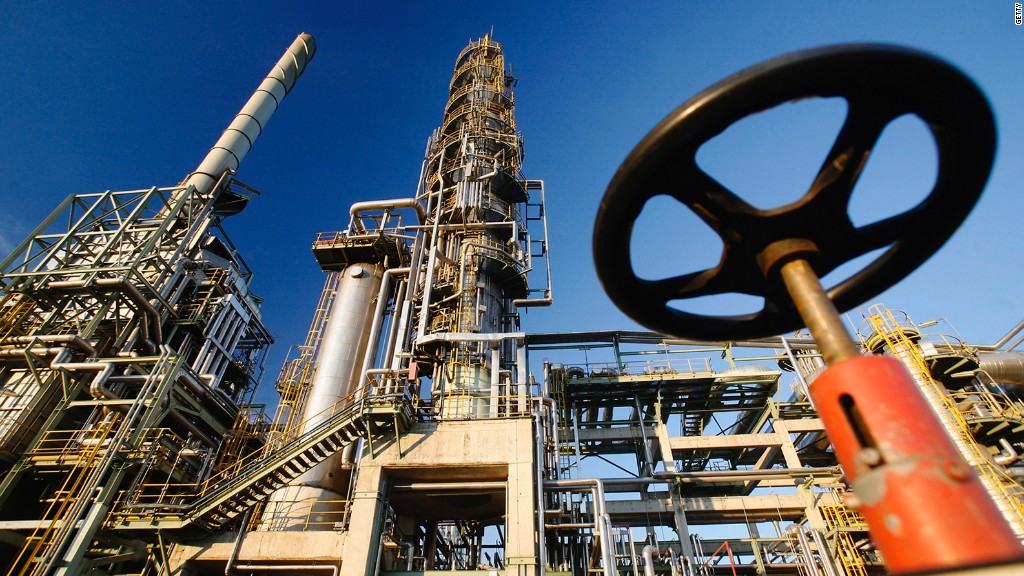
Oil prices keep careening lower -- and that's spooking the stock market.
Crude oil fell 4%, sliding below $41 a barrel on Wednesday for the first time since early 2009. The continued meltdown in oil sent energy-related stocks plunging.
The Dow closed the day down 160 points to its lowest close since January -- led by selloffs from Chevron (CVX) and ExxonMobil (XOM). The S&P 500 and the Nasdaq also slid nearly 1% each. Earlier in the day, the Dow was off as much as 228 points.
While falling oil prices are great for American consumers, they sometimes alarm investors who see them as a red flag about their effect on the global economy.
"If oil breaks below $40 a lot of our clients will see it as a watershed moment. It begins to signal more about economic recession, maybe not here, but broadly," said Nicholas Colas, chief market strategist at ConvergEx.
Oil prices have been under renewed pressure in recent weeks because the supply glut continues to worsen just as global demand remains sluggish.
Fresh evidence of the oversupply problem was revealed on Wednesday. The government said crude stockpiles surged by 2.6 million barrels last week. That's huge considering analysts had anticipated a steep decline of over 1 million barrels.
No wonder oil plunged over 4% to as low as $40.46 in the aftermath of the report.
The falling prices sparked selling in energy stocks. They were the biggest losers in the S&P 500 on the day, with Marathon Oil (MRO), Chesapeake Energy (CHK)and Apache (APA) tumbling between 4% and 7% a piece.
Related: Why oil prices could sink to $15 a barrel
Latin America, Asian economies at risk
The market slide goes beyond the action in the oil pits though. Investors were once again expressing concern about emerging markets, especially in China. The shockwaves from China's surprise currency devaluation last week continue to be felt around the world.
"The selling in emerging markets has been going on all summer. Now it's spilling over to developing markets," said Aknur Patel, chief investment officer at R-Squared Macro Management.
Many countries in Latin America and elsewhere, like Brazil and Chile, that rely on raw materials like oil, gold and copper exports have been slammed by falling prices.
Currencies in Asia are also tumbling, bringing back memories of the financial crisis that ripped through the continent in the late 1990s.
The Malaysian ringgit has lost almost a quarter of its value against the dollar over the past year, while Indonesia's rupiah is down 15%. Both currencies are now at levels unseen since that crisis.
Related: Ghosts of 1997 return to haunt Asia
So why does that matter to U.S. investors? The world is far more connected than it was two decades ago. What happens in one market can create turmoil on the other side of the globe.
"All of these countries are at risk for a credit and liquidity crunch," said Michael Block, chief market strategist at Rhino Trading Partners. "Someone will have to clean that up."
Emerging markets are also feeling the heat from the U.S. Federal Reserve. An interest rate hike could come from the Fed as early as next month, causing investors to yank funds from emerging markets in favor of stronger currencies like the U.S. dollar.
Related: Watch out: Strong U.S. dollar could trigger a currency crisis
Could rate hike trigger long-awaited 'correction?'
If the Fed does indeed raise rates in September, the markets could be in store for more volatility.
R-Squared's Patel said his research of global stock markets shows that stocks typically retreat before an interest rate hike.
"A 10% drop is not abnormal. I would say it's actually expected," Patel said.
If it happened, a decline of that magnitude would give the U.S. stock market its first "correction" since October 2011. Corrections can be scary for investors, but they can also be healthy in the longer term by consolidating previous gains and allowing new participants a chance to enter.
"We don't expect that downturn to last too long. You could easily see the markets recover those losses over the next six months," Patel said.


